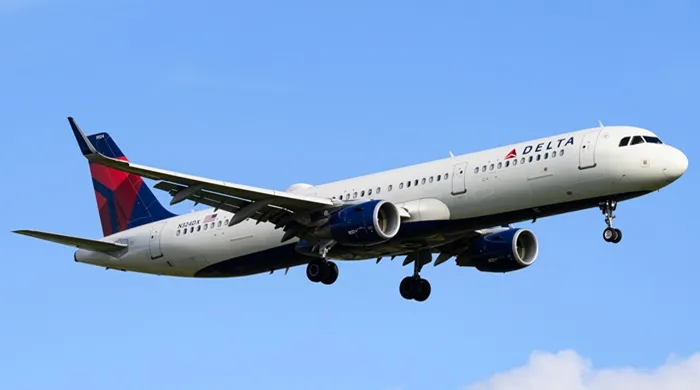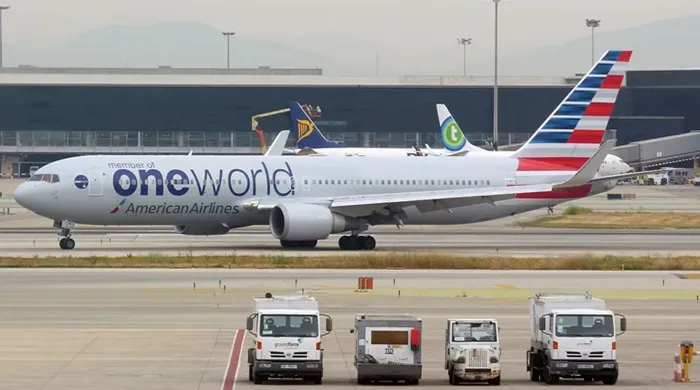A crew member who is thought to be one of only two survivors of a South Korean jet plane crash has described the horrifying moment they knew a jet engine had exploded.
Just two people - both crew members, one male and one female - are believed to have survived among the 181 people on board the Jeju Air flight, a Boeing 737-800. Government officials have confirmed an official death toll of 179.
The crew member, who has yet to be identified and is currently being treated at a local hospital, said that one of the plane's engines exploded into smoke as it approached Muan International Airport at 8:30am local time.
The Jeju Air flight was returning from Bangkok when the horror unfolded at the airport, the Yonhap news agency reported.
The South Korean Ministry of Land, Infrastructure and Transport is investigating the possibility the crash was caused by 'contact with birds, resulting in malfunctioning landing gear' as the plane attempted to land at the airport in the country's southwest, though no official verdict has been given.
Ju Jong-wan, a director of aviation policy at the Ministry of Land, Infrastructure and Transport, said that a mayday alert was sent out one minute after air traffic control warned of a possible bird strike. The plane crashed two minutes later.
Terrifying footage broadcast by local MBC-TV showed the moment the aircraft started to show some sort of explosion out of one side as it neared the airport.
A witness to the crash said he noticed sparks, flames and explosions before the doomed flight crash landed.
Kim Yong-cheol, 70, told Yonhap News that he was staying by the airport and noticed something was wrong.
'I saw the plane descending and thought it was about to land when I noticed a flash of light,' Cho said. 'Then there was a loud bang followed by smoke in the air, and then I heard a series of explosions.'
Kim said the plane missed the initial landing before circling back and making the final fatal attempt.
Jeju Air chief executive, Kim E-bae offered a lengthy apology that was translated by The Guardian.
'First, we bow our heads in apology to everyone who has trusted Jeju Air. At approximately 9:03am on 29 December, flight 7C2216 from Bangkok to Muan caught fire while landing at Muan International Airport.
'Above all, we express our deepest condolences and apologies to the families of the passengers who lost their lives in this accident. At present, the cause of the accident is difficult to determine, and we must await the official investigation results from the relevant government agencies.
'Regardless of the cause, as CEO, I feel profound responsibility for this incident. Jeju Air will do everything possible to promtly manage this accident and support the families of those aboard. We will also do our utmost to determine the cause of the accident in cooperation with the government.
'Once again, we pray for those who lost their lives in this accident and offer our deepest apologies to their bereaved families.'
Kim said the company hadn´t identified any mechanical problems in the aircraft following regular checkups and that he would wait for the results of government investigations into the cause of the incident.
Boeing released a statement of its own on Sunday morning, writing: 'We are in contact with Jeju Air regarding flight 2216 and stand ready to support them.
'We extend our deepest condolences to the families who lost loved ones, and our thoughts remain with the passengers and crew.'
Philip Goldberg, the US ambassador to South Korea, wrote on social media: 'I was heartbroken to hear about the tragedy at Muan Airport this morning. My sincerest condolences go out to the victims and their loved ones, and my thoughts are with the people of Korea during this difficult time.'
Most of the passengers are Korean, except for two Thai nationals.
The first 120 confirmed dead include at least 54 men and 57 women, though nine others were so badly injured their gender was not immediately clear.
Emergency workers pulled out two people, both crew members, to safety, and local health officials said they remain conscious. The fire agency deployed 32 fire trucks and several helicopters to contain the fire, it said.
Lee Jeong-hyeon, chief of the Muan fire station, told a televised briefing that rescue workers are continuing to search for bodies scattered by the crash impact.
The plane was completely destroyed, with only the tail assembly remaining recognizable among the wreckage, he said.
Workers were looking into various possibilities about what caused the crash, including whether the aircraft was struck by birds that caused mechanical problems, Lee said.
Senior Transport Ministry official Joo Jong-wan separately told reporters that government investigators arrived at the site to investigate the cause of the crash and fire.
Emergency officials in Muan said the plane´s landing gear appeared to have malfunctioned. The Transport Ministry said the plane was returning from Bangkok and its passengers include two Thai nationals.
Thailand´s prime minister, Paetongtarn Shinawatra, expressed deep condolences to the families of those affected by the accident through a post on social platform X.
Paetongtarn said she had ordered the Ministry of Foreign Affairs to provide assistance immediately.
According to Flightradar data, the plane was a Boeing 737-800 departed from Bangkok at 2.29am local time and was due to arrive at 8.30 but landed at 8.59am.
A photo showed the tail section of the jet engulfed in flames on what appeared to be the side of the runway, with firefighters and emergency vehicles nearby.
Firefighters have now put the fire out and search and rescue operations are now under way at the site.
An on-site investigation has now been launched to determine the exact cause of the crash.
Despite being known as a cheaper flying option, Jeju Air had a largely good safety record leading up to Sunday's crash.
In 2023, the airline had an 'A' rating from the South Korean Ministry of Land, Infrastructure and Transport, which is considered 'very good.' Airlines got as high a grade as A++ last year.
Jeju Air was the subject of a federal investigation for a plane having flown despite having a defect in the tip of its wings in 2023. That year, federal judges gave them a 'C' for safety.
It was previously reported that this was the first crash in the airline's history which dates back to 2005.
The crash is already one of the deadliest disasters in South Korea´s aviation history.
The last time South Korea suffered a large-scale air disaster was in 1997, when a Korean Airline plane crashed in Guam, killing 228 people on board.
In 2013, an Asiana Airlines plane crash-landed in San Francisco, killing three and injuring approximately 200.
Sunday´s accident was also one of the worst landing mishaps since a July 2007 crash that killed all 187 people on board and 12 others on the ground when an Airbus A320 slid off a slick airstrip in Sao Paulo and collided with a nearby building, according to data compiled by the Flight Safety Foundation, a nonprofit group aimed at improving air safety.
In 2010, 158 people died when an Air India Express aircraft overshot a runway in Mangalore, India, and plummeted into a gorge before erupting into flames, according to the safety foundation.
The incident came as South Korea is embroiled into a huge political crisis triggered by President Yoon Suk Yeol´s stunning imposition of martial law and ensuing impeachment.
Last Friday, South Korean lawmakers impeached acting President Han Duck-soo and suspended his duties, leading Deputy Prime Minister Choi Sang-mok to take over.
Choi ordered officials to employ all available resources to rescue the passengers and crew before he headed to Muan.
Yoon´s office said his chief secretary, Chung Jin-suk, will preside over an emergency meeting between senior presidential staff later on Sunday to discuss the crash.
Read more on our live blog, here: South Korea plane crash latest: Dozens dead after aircraft's 'landing gear fails' with 181 onboard




